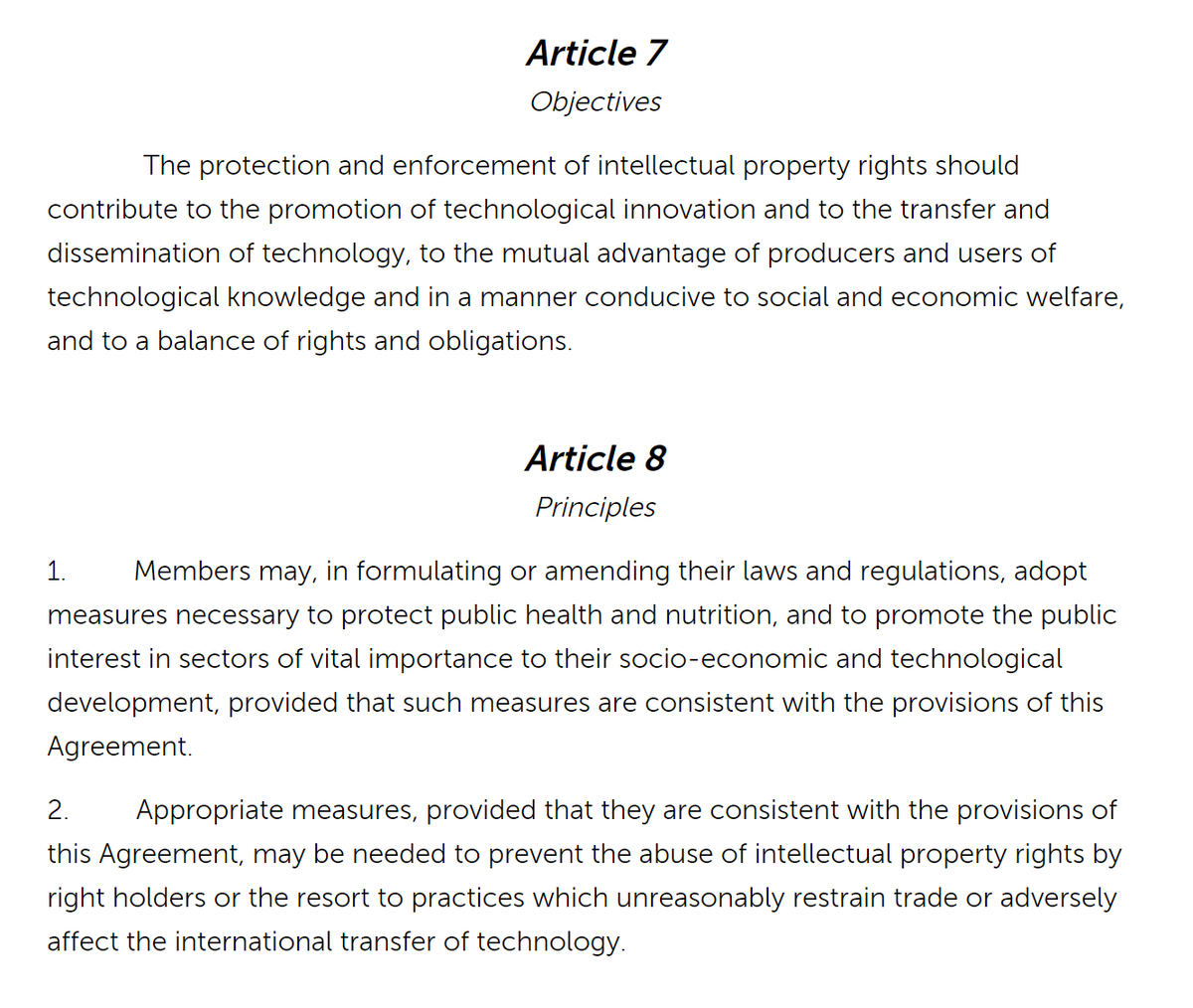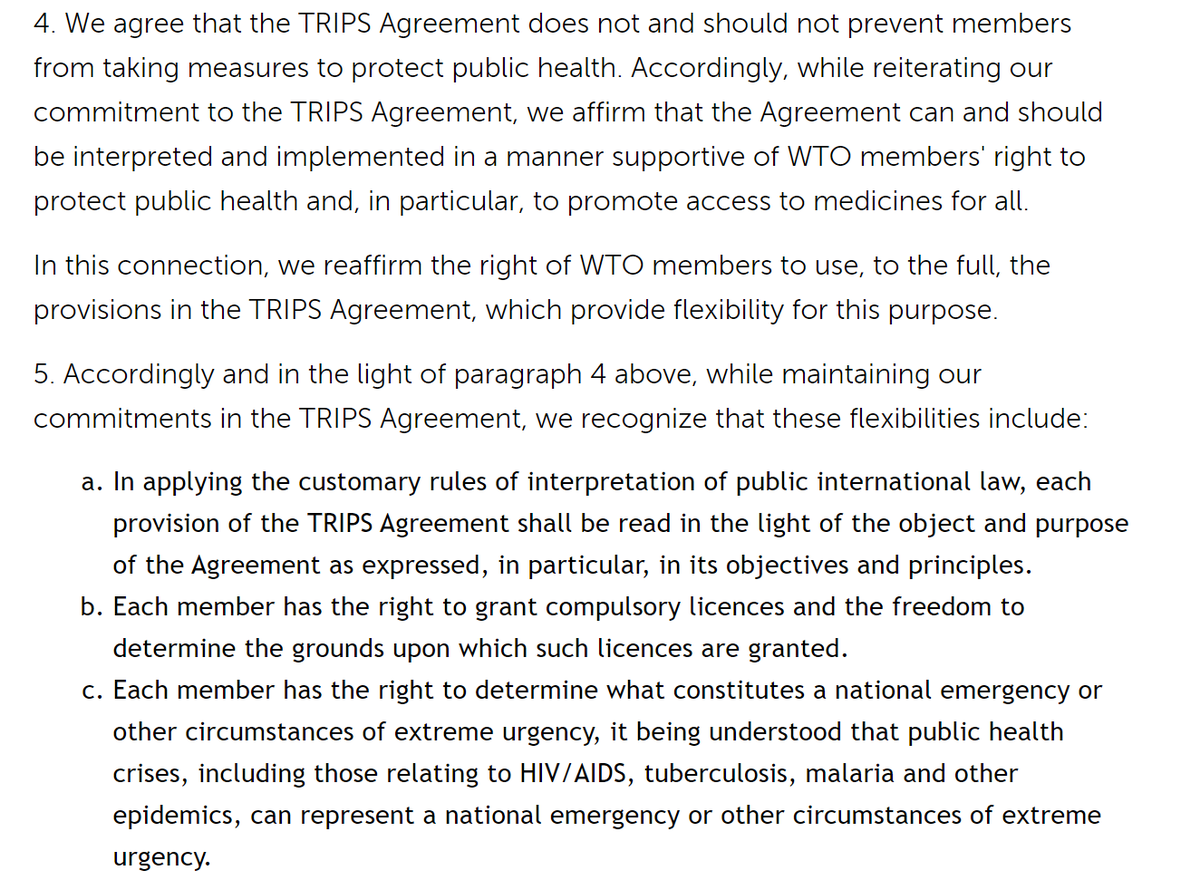We now have @USTradeRep support for a TRIPS waiver (if not for the TRIPS waiver). I hope @Trade_EU and @Itamaraty_EN will follow. So here& #39;s a thread on (A) what TRIPS allows, waiver or not; (B) what rights a TRIPS waiver adds; and (C) what we should try to get beyond a waiver.1/ https://twitter.com/berndlange/status/1390035687253106694">https://twitter.com/berndlang...
A. The TRIPS already features a number of exceptions to its rules. Most well known is the exception for compulsory licensing of patents (Art 31). Countries don& #39;t need WTO authorization to use this exception. Last week, the Brazilian Senate approved a new law to speed this up. 2/
And there are other exceptions. Most boldly, some have proposed using the exception that allows countries to that action they "consider necessary" to protect their essential security interests during an emergency in international relations. Personally, I find securitization 3/
of policy objectives a problematic path to tread. But TRIPS itself allows for "limited exceptions" to all intellectual property rights. If another IP right is interfering with the use of compulsory licensing, for example, it would be very defensible to resort to this exception.4/
And remember: in interpreting these provisions, we must have in mind the TRIPS Principles and Objectives and, in case they are insufficient, the 2001 Doha Declaration, which states TRIPS "does not and should not prevent members from taking measures to protect public health". 5/
Although they often fly below the news radar, there is significant use of TRIPS flexibilities. For example, in March 2020 Israel issued a compulsory license "authorizing the importation of Kaletra for the sole purpose of treating patients with covid-19".6/ https://www.keionline.org/32503 ">https://www.keionline.org/32503&quo...
So a combination of (i) TRIPS having significant flexibilities; (ii) these flexibilities being vague and subject to self-interpretation, on the basis of the Doha Declaration, until a dispute settlement panel could weigh in (2023?), always gave individual states a wide margin. 7/
B. What good is a waiver, then? Most importantly, it means states will not dispute uses of permitted flexibilities. The US, in particular, has historically been an IP hawk. In 1980s, before TRIPS existed, it was enforcing IP rules abroad through trade retaliation legislation. 8/
Enforcement of IP rules abroad goes way before WTO or GATT. The Paris IP Convention was adopted in 1883. Adopting and enforcing patents was one of the demands put before China in the 1920s to remove extraterritoriality. To this day, resort to TRIPS-lawful CL leads to pressure. 9/
There& #39;s a whole other conversation to be had about this (see C), but at this point a waiver will be very helpful if it means countries can issue CL, and companies can produce medicines under CL, free from political pressure and litigation. 10/
B2. The waiver will allow international trade in products produced under CL. While producing products under CL is TRIPS-lawful, trading these products internationally is a legal nightmare. So much so that the so-called "Paragraph 6 system" of the Doha Declaration, which allows11/
International trade in medicines produced under CL, was used exactly once, in 2007, when the system was created. Photos taken, no company wanted to got though the process ever again. 12/ https://www.wto.org/english/news_e/news07_e/trips_health_notif_oct07_e.htm">https://www.wto.org/english/n...
What is wrong with it? Sparing you the details, two things. First, it is highly bureaucratic. Everyone has to notify everything they are doing to the WTO, which is expensive and difficult, and the products have to be labelled clearly to avoid diversion to third markets. 13/
Second, many countries just don& #39;t have the legislation in place allowing this to happen. This is a broader problem. It& #39;s not just that big countries like Brazil and India are the ones with manufacturing capacity. It& #39;s that writing down the legislation that allows you to use 14/
these exceptions requires both technical legal capacity and the economic/political clout to resist contrary pressure, not at the macro-level of the WTO but at the domestic legislative level. 15/
So a proper waiver should make sure that (a) the bureaucratic burden of using CL and trading the CL products internationally is removed; and (b) the applicable international rules are clear, so that all states have access to a WTO-compliant "Model Compulsory Licensing Law". 16/
B3. On the issue of TRIPS+: the vast majority of FTAs refers back to TRIPS & Doha for the relationship between IP rules and public health (or are pre-Doha). In my view, a decision at WTO level would, well, "trickle down" to the interpretation of the applicable FTA rules. 17/
C. OK, so what is missing? Governance. As I hope to have showed with A, individual state action was always possible. As Israel demonstrated, even importing for usually "non-importing countries" is possible if you have the laws, political will and economic clout to apply them. 18/
But this is not a self-evident combination. Many countries, maybe most, don& #39;t have a workable legislation & responsive CL bureaucracy in place. Maybe they come up with one today but leave iy dormant. The same way there is an obligation to transparently implement legislation 19/
to protect IP rules, there should be an obligation - not just a right - to have in place a workable, responsive and enforceable legal framework for CL. I don& #39;t know if it should be the WTO doing this. I am tempted to say yes, for practical reasons and to give it a WTO imprint.20/
But /some/ international body should be checking that countries, the same way they report on and justify their new trade-restrictive measures, have to report on - and justify - their new CL-restrictive measures. 21/
To close, the production chain of vaccines and many medicines is global. Individually applied CL may be episodically useful, if what you need is a ready-made product. But to get products produced under CL to be made within a workable production chain, we need a sort of global 22/
mechanism where production under CL can be checked and coordinated. Just removing the WTO from the equation is unlikely to give companies and countries the legal and political certainty they need to invest millions in manufacturing and ensuring the safety of medicines. 23/ https://abs.twimg.com/emoji/v2/... draggable="false" alt="✂️" title="Schere" aria-label="Emoji: Schere">
https://abs.twimg.com/emoji/v2/... draggable="false" alt="✂️" title="Schere" aria-label="Emoji: Schere">
Addendum 1: This is obviously only one aspect of the puzzle. I am not claiming IP is the main obstacle to vaccine production or that removing it would land us millions of vaccines. What I am saying is we need a forum to make sure that, where this is the issue, it does not happen.
Addendum 2: For full disclosure, I have been doing some research with student and participating in activities organized by @HAImedicines on the use and potential use of CL. Nothing I said or say here represents them (but they& #39;re great - follow them!).
Thank you for coming to my TED Talk!

 Read on Twitter
Read on Twitter



